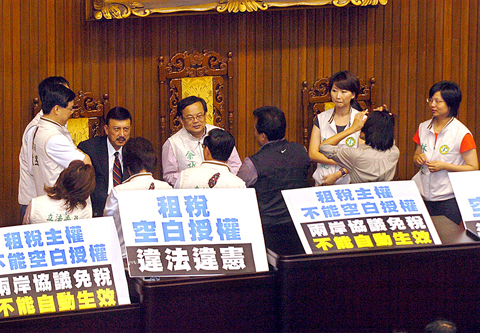The Democratic Progressive Party (DPP) said yesterday it opposed a proposal to allow Taiwanese businesses or individuals based in China to avoid paying taxes in Taiwan on income earned in China.
The legislature was scheduled to review an amendment to Article 25 of the Act Governing the Relations Between the Peoples of the Taiwan Area and the Mainland Area (兩岸人民關係條例) yesterday that would give the Executive Yuan the right to issue orders on cross-strait business taxation.
The KMT wants the bill passed to eliminate dual taxation on the cross-strait shipping sector.

PHOTO: FANG PIN-CHAO, TAIPEI TIMES
But the session was deadlocked over the issue yesterday morning after legislators failed to reach a consensus on the amendment. DPP legislators occupied the speaker’s podium in a bid to prevent the KMT from calling a vote on the bill.
DPP caucus whip Ker Chien-ming (柯建銘) threatened to “fight to the death” to block the bill.
At a press conference later in the day, KMT caucus whip Lin Yi-shih (林益世) criticized the DPP for paralyzing the plenary session: “We were supposed to deal with a number of bills today ... all bills should have been dealt with by democratic principles.”
Lin said the KMT might convene extraordinary sessions this summer to pass more bills.
“KMT legislators are more than happy to sacrifice our personal time if the legislature is unable to pass bills aimed at improving people’s livelihoods,” Lin said.
DPP spokesman Cheng Wen-tsang (鄭文燦) said the government wanted to ensure that Taiwanese and Chinese businesses were not taxed in both Taiwan and China, but it was going about it the wrong way. The government should amend the Business Tax Act (營業稅法) and the Income Tax Act (所得稅法), not the Act Governing the Relations Between the Peoples of the Taiwan Area and the Mainland Area, to give the Executive Yuan the right to issue orders on cross-strait tax, Cheng said.
He said the Constitution stipulates that changes to tax laws have to be regulated by law, and it would be unconstitutional if the government changed tax rules through administrative orders.
Cheng said Taipei and Beijing inked an agreement in April promising that Chinese and Taiwanese shipping companies would not be subject to dual taxation. The government wanted to expand the shipping pact to cover all businesses and was doing so in an underhanded manner, he said.
The government should not deprive the legislature of the right to approve laws by expanding its use of administrative orders, he said.
Meanwhile, DPP Legislator Chang Hwa-kuan (張花冠) accused the government of preparing to allow Chinese capital to be invested in Budai Harbor (布袋港), Chiayi County.
Association for Relations Across the Taiwan Strait Deputy Chairman Zheng Lizhong (鄭立中) visited the harbor with KMT Legislator Wong Chung-chun (翁重鈞), who represents Chiayi County. Chang said they discussed Chinese capital investment in Budai Harbor.
Cheng Wen-tsang said the party opposed allowing Chinese investment in airports, harbors and other infrastructure that has strategic significance because this would jeopardize national security.
He said Chinese investment in Taiwan’s airports and harbors was politically motivated.

The CIA has a message for Chinese government officials worried about their place in Chinese President Xi Jinping’s (習近平) government: Come work with us. The agency released two Mandarin-language videos on social media on Thursday inviting disgruntled officials to contact the CIA. The recruitment videos posted on YouTube and X racked up more than 5 million views combined in their first day. The outreach comes as CIA Director John Ratcliffe has vowed to boost the agency’s use of intelligence from human sources and its focus on China, which has recently targeted US officials with its own espionage operations. The videos are “aimed at

STEADFAST FRIEND: The bills encourage increased Taiwan-US engagement and address China’s distortion of UN Resolution 2758 to isolate Taiwan internationally The Presidential Office yesterday thanked the US House of Representatives for unanimously passing two Taiwan-related bills highlighting its solid support for Taiwan’s democracy and global participation, and for deepening bilateral relations. One of the bills, the Taiwan Assurance Implementation Act, requires the US Department of State to periodically review its guidelines for engagement with Taiwan, and report to the US Congress on the guidelines and plans to lift self-imposed limitations on US-Taiwan engagement. The other bill is the Taiwan International Solidarity Act, which clarifies that UN Resolution 2758 does not address the issue of the representation of Taiwan or its people in

US Indo-Pacific Commander Admiral Samuel Paparo on Friday expressed concern over the rate at which China is diversifying its military exercises, the Financial Times (FT) reported on Saturday. “The rates of change on the depth and breadth of their exercises is the one non-linear effect that I’ve seen in the last year that wakes me up at night or keeps me up at night,” Paparo was quoted by FT as saying while attending the annual Sedona Forum at the McCain Institute in Arizona. Paparo also expressed concern over the speed with which China was expanding its military. While the US

SHIFT: Taiwan’s better-than-expected first-quarter GDP and signs of weakness in the US have driven global capital back to emerging markets, the central bank head said The central bank yesterday blamed market speculation for the steep rise in the local currency, and urged exporters and financial institutions to stay calm and stop panic sell-offs to avoid hurting their own profitability. The nation’s top monetary policymaker said that it would step in, if necessary, to maintain order and stability in the foreign exchange market. The remarks came as the NT dollar yesterday closed up NT$0.919 to NT$30.145 against the US dollar in Taipei trading, after rising as high as NT$29.59 in intraday trading. The local currency has surged 5.85 percent against the greenback over the past two sessions, central